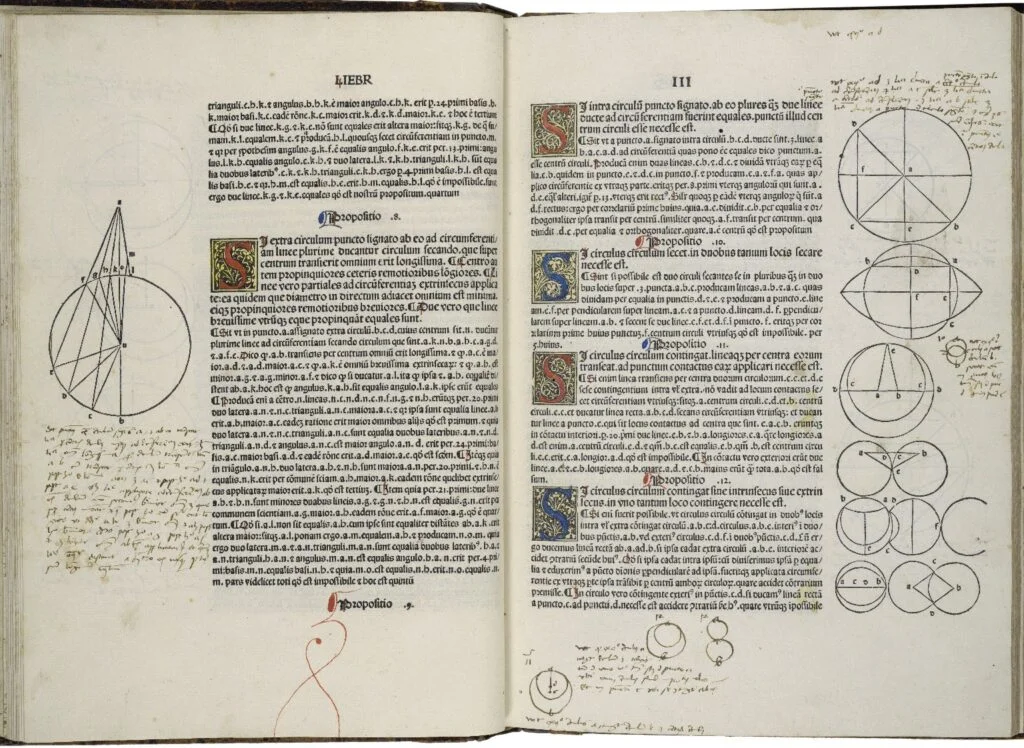In the early 1850s, while serving as a lawyer in Illinois, Abraham Lincoln decided to read a difficult book, Euclid’s Elements, a mathematical treatise written by Euclid an ancient Greek mathematician around 300 BC. It is a collection of definitions, postulates, propositions, and mathematical proofs of the propositions.

Euclid’s Elements, a compilation of thirteen books on geometry and number theory, was not an easy read. Its complex proofs and abstract concepts pose a significant challenge even for seasoned mathematicians let alone someone like Lincoln with no formal education in mathematics.
Who Was Euclid?
Euclid was a Greek mathematician living in Alexandria around 300 BC. He is often referred to as the “Father of Geometry” due to his highly influential textbook Elements. Not much is known about Euclid’s life, but he helped formalize and establish geometry as a mathematical system.
Elements covered plane and solid geometry, number theory, proportion, and more. It introduced logical reasoning and the concept of formal proof to mathematics. Through a series of definitions, postulates (self-evident statements), common notions, and logically proved theorems, Euclid was able to derive over 400 conclusions about geometric shapes and their properties.

Why on earth would he want to read a book like this? Well, Euclid’s Elements was the book that established the foundations of logical thought over two millennia ago. Lincoln knew that within its pages lay the tools to develop rigorous deductive reasoning through Euclid’s emphasis on definitions, axioms, and proofs. He understood that Euclidean thinking as applied to politics by John Locke had profoundly shaped the minds of the founding fathers. For a self-taught lawyer and aspiring politician like Lincoln, mastering the logical methods of Euclid offered a strategic advantage to influence others through the power of persuasion and argument. It was a book that could help arm him with the intellectual weapons to challenge conventions and change minds. That is why Lincoln was so compelled to read this challenging work – because he knew it contained ideas that could change history.
Lincoln Dedicated Himself To Reading A Difficult Book
Abraham Lincoln had less than a year of formal education in his childhood. Most of his learning occurred through self-education and reading. He pursued a career in law through self-study and, of course, we all know where his career led him.
Undeterred by the book’s difficulty, Lincoln dedicated countless hours to studying Euclid’s Elements. He would often be seen with a copy of the book in his hands, poring over its pages during breaks in his legal work or late into the night. Lincoln’s commitment to understanding the intricate principles of geometry showcased his unwavering determination and intellectual fortitude.
As Lincoln delved deeper into Euclid’s Elements, he encountered numerous obstacles. The book demanded rigorous logical reasoning and a deep understanding of mathematical concepts. Lincoln, not having received a formal education, faced additional challenges in comprehending the material. However, he refused to be discouraged and persisted in his pursuit of knowledge.
To aid his understanding, Lincoln sought the guidance of a local mathematician, Professor Charles Davies. The two engaged in lengthy discussions, with Lincoln posing questions and seeking clarification on various aspects of Euclid’s work. Through their collaboration, Lincoln gradually unraveled the intricacies of the mathematical treatise.
Lincoln’s efforts to read Euclid’s Elements were not in vain. His perseverance paid off, as he developed a solid grasp of the principles of geometry and gained a deeper appreciation for the power of logical reasoning. This newfound knowledge would later prove invaluable in his political career, where he often employed logical arguments to support his positions.
Abraham Lincoln’s journey with Euclid’s Elements serves as a testament to the effort required to read difficult books. It highlights the importance of perseverance, seeking guidance when needed, and the rewards that come with conquering intellectual challenges. Lincoln’s determination to understand a complex work like Euclid’s Elements exemplifies his lifelong commitment to self-improvement and intellectual growth.
Why Would You Want To Read Difficult Books?
Based on the example of Abraham Lincoln tackling Euclid’s Elements, here are a few reasons why it’s important to read difficult books:
- It expands your knowledge and skills. By pushing through challenging material, you learn new concepts and subjects that otherwise may have remained unknown. For Lincoln, studying geometry helped develop his logical reasoning abilities.
- It improves critical thinking. Difficult books require focused analysis and an openness to having preconceptions challenged. This strengthens abilities like problem-solving, evaluation, and forming well-supported arguments.
- It builds mental resilience. Facing intellectual obstacles in reading builds determination, perseverance, and confidence in one’s ability to overcome setbacks. Lincoln showed persistence in comprehending Euclid.
- It has practical applications. Lincoln directly applied the logical skills gained from Euclid to his legal and political careers. Difficult reading materials can provide knowledge relevant to one’s work or interests.
- It’s intellectually stimulating. A challenging book keeps the mind actively engaged and provides a sense of accomplishment. Lincoln was noted to tell people that he had mastered Euclid’s Elements because he was proud of the dedication it took.
How To Read Difficult Books
When it comes to reading difficult work it can feel like a slog and very much like hard work. Books aren’t always meant to be easy. These tips will help you on your journey:
Take It Slow
Dedicate 30 minutes at a time to reading a difficult book. Read in small chunks and re-read passages as needed. Lincoln knew that to fully comprehend Euclid would require careful, gradual study over an extended period.
Read Something Else
Don’t even think about reading a difficult book just before bed. Always have something light and entertaining to read as well as difficult work. Make time to study the difficult book, it requires intense focus and actively engaging with the material. Outside of this have something else to read as a means of entertainment. You will read more books this way rather than devoting all your reading to difficult material.
Use Additional Resources.
Consult summaries, commentaries, or experts, if you can, as Lincoln did with Professor Davies to help explain complex ideas. When stuck on a proof, Lincoln would consult with Davies to discuss interpretations and get guidance on applying Euclid’s principles. Today we have a much greater wealth of information that can be consumed for free, YouTube videos, study guides, and the internet which can help decipher difficult passages.
Discuss With Others.
Explaining concepts aloud or debating ideas, as Lincoln did with Davies, reinforces understanding. I find this to be a lot better than taking notes. Trying to explain to a close friend, or a willing volunteer, the concepts and meaning of sections of a work helps to retain the information. Lincoln found that having to verbalize Euclid’s ideas to Davies, and defending or critiquing them, solidified his own comprehension in a profound way.
Don’t Get Discouraged.
We have all been reading only to come to the realization that nothing you’ve just read has made any sense to you. Persist through obstacles like Lincoln did, with regular practice and effort over time. When concepts initially eluded Lincoln, he persisted in his regular study, knowing breakthroughs would come with dedicated work over the long-term.
Connect It To Other Knowledge.
Seeing relationships between a book’s content and other areas makes it more engaging and memorable. Lincoln linked ideas in Euclid to his study of law, politics, and philosophy to integrate and deepen his understanding.
